A review on effect of plant growth regulators on physico-chemical attributes of Phalsa (Grewia subinaequalis D.C.)
Bạn đang xem bản rút gọn của tài liệu. Xem và tải ngay bản đầy đủ của tài liệu tại đây (249.22 KB, 10 trang )
Int.J.Curr.Microbiol.App.Sci (2017) 6(5): 1929-1938
International Journal of Current Microbiology and Applied Sciences
ISSN: 2319-7706 Volume 6 Number 5 (2017) pp. 1929-1938
Journal homepage:
Review Article
/>
A Review on Effect of Plant Growth Regulators on Physico-Chemical
Attributes of Phalsa (Grewia subinaequalis D.C.)
Ashok Kumar Meena*, A. K. Singh and Bhujbal Singh
Department of Horticulture, College of Horticulture and Forestry, Narendra Deva University of
Agriculture and Technology, Narendra nagar (Kumarganj), Faizabad-224 229 (U.P.) India
*Corresponding author
ABSTRACT
Keywords
Phalsa,
Physico-chemical
attributes,
Plant growth
regulators
Article Info
Accepted:
19 April 2017
Available Online:
10 May 2017
The present investigation entitled “The effect of foliar feeding of plant growth regulators
on physico-chemical attributes of phalsa (Grewia subinaequalis D.C.)” was conducted at
Main Experiment Station, Horticulture, Narendra Deva University of Agriculture &
Technology, Kumarganj, Faizabad, Uttar Pradesh during 2014-2015 in Randomized Block
Design and replication three and ten treatments T 1 - Control (Water spray), T 2-GA3 50
ppm, T3-GA3 100 ppm,T4-GA3 150 ppm,T5-NAA 50 ppm,T6-NAA 100 ppm,T7 –NAA
150 ppm, T8 Ethrel 50 ppm, ethrel T9 100 ppm, ethrel T10 150 ppm. Physico-chemical
characters like as fruit length & width, weight of 50 fruits, pulp-stone ratio, ascorbic acid
content, etc. were increased and acidity per cent was reduced with the application of GA 3
@ 150 ppm, however total soluble solids and sugars (reducing, non-reducing, total sugar)
content were improved by ethrel 100 ppm amd it is also effective in reducing acidity. It is
clear from the data foliar application of GA3@150 ppm effective to increase vegetative
growth, yield and quality parameter respectively and ethrel@100 ppm was found best in
quality improvement in phalsa fruits. A wider research has been done in the use of plant
growth regulators and it is very effective in all fruits crops specially subtropical and
tropical fruit crops. Hence plant growth regulators are very effective in improving physicochemical attributes or quality of phalsa fruits.
Introduction
Phalsa (Grewia subinaequalis D.C.) is a
subtropical fruit belongs to family Tiliaceae
and its fruit are known as berry. Phalsa is a
quick growing very hardy shrub which thrives
well in arid and semi-arid region as well as in
salt affected wasteland condition. It has high
nutritional value, containing mineral like iron,
phosphorus and vitamins like A and C having,
50-60 per cent juice, 10-11 per cent sugar.
The fruits are very delicious, tasty and used as
table purpose. The fruits are excellent for
making juice and squash, ready to serve,
nectar, syrup. However, it is mostly used as
fresh fruit and has cooling effect. Application
of growth substances viz., auxins and
gibberellins has been effective in increasing
fruit set and yield in several fruit crops
including phalsa. Characteristics of fruits such
as length, width, pulp-stone ratio and weight
of 50 fruits were increased due to foliar
feeding plant growth regulators and they can
also improve fruit quality, plant growth
regulators improve better formation and
translocation of food, hormonal signaling by
gibberellins, similar results were found by
Chandra et al., 2015. Gibberellins decreases
1929
Int.J.Curr.Microbiol.App.Sci (2017) 6(5): 1929-1938
in acidity due to hormones application [might
be due to increase translocation of
carbohydrates and increase metabolism due to
conversion of acids to sugar. Gibberellins
improved quality of fruits supported by many
researches in fruit crops such as Yadav et al.,
(1974), Singh et al., (1977), Grewal et al.,
(2000), Sharma et al., (2002), Young et al.,
(2003), Yadav et al., (2005), Kher, (2005),
Singh et al., (2011) and Byas et al., (2014)].
Plant growth regulators signaling the various
metabolic processes in plants such as apical
dominance, inhibition of apical dominance,
regulating flowering and early ripening by
using ethrel in less amounts is very effective.
Plant growth regulators can also increase the
ascorbic acid content in fruits by synthesis of
catalytic activity of several enzymes and coenzymes which are essential in ascorbic acid
synthesis. So that plant growth regulators may
improve physico-chemical characters like as
fruit length & width, weight of 50 fruits, pulpstone ratio, ascorbic acid content, total soluble
solids, sugars through better formation and
translocation of carbohydrates, starch
hydrolysis and early maturation phalsa fruits
by ethrel Kacha et al., (2014). Hence plant
growth regulators are very effective in
improving physico-chemical attributes or
quality of phalsa fruits (Bankar et al., 1990;
Chundawat et al., 1973; Ray et al., 1992;
Byas et al., 2014; Yadav et al., 2011; Ahmed
et al., 2012; Agarwal et al., 2010; Ghosh et
al., 2009; Kumar, 2010; Garasiya et al., 2013;
Karole et al., 2016). Review on physicochemical attributes of fruits: Randhawa and Sharma (1962) observed that
spray of NAA at 25, 50 and 75 ppm on sweet
orange (Citrus sinensis Osbeck) var. Jaffa,
pineapple and Mosambi increased the fruit
size. Prasad and Bajpai (1963) found that
spray of NAA with concentrations of 25-75
ppm at full bloom stage and again 10days later
on phalsa (Grewia asiatica L.) var. Sharbati
increased fruit size, while, maximum diameter
was obtained with 50ppm NAA.
Prasad and Jauhari (1963) reported that
spraying of NAA and 2,4,5-T ranging from
10-100 ppm on 16 year old tree of litchi
(branches of newly fruit set) at 1st April and
15 days later improved fruit size.
Prasad and Prasad (1966) reported that GA3
and NAA each 25, 50 and 100 ppm
concentration were applied on the plant of
grape at full bloom and fruit setting stage.
Among these GA3 100ppm was the best
treatment for improved the TSS content.
Srivastava and Singh (1969) observed that
application of GA3 at 25ppm and 50ppm of
litchi, 4 weeks after fruit set, increased the
TSS content.
Veera and Das (1971) reported that mangoes
cv. Banganpalli was sprayed with NAA and
GA3 each at 10, 20 and 40, ppm concentration.
All the concentration increased TSS content
and greatest increased was found with
spraying of 40 ppm NAA.
Prasad and Pathak (1972) found that newly set
mango fruits were sprayed with NAA at 25,
50, 75 and 100 ppm. All treatments increased
the total soluble solids. The lowest
concentration 25 ppm was most effective.
Yadav and Pandey (1974) observed that
application of GA3 increase the bunch weight
in grape without deteriorating the fruit quality.
Singh et al., (1977) reported that mango fruit
weight was increased by the application of
GA3, NAA and 2,4 5-T each at 50,100 and 250
ppm Concentration. Rahman et al., (1980)
reported that pineapple plant cv. Giant kew,
were treated with NAA at 0-80ppm gave
increase fruit weight as compared to control.
1930
Int.J.Curr.Microbiol.App.Sci (2017) 6(5): 1929-1938
Biswas et al., (1988) also reported that the
TSS increased due to its action on converting
complex substances into simple ones, which
enhances the metabolic activity in guava
fruits.
Sharma et al., (2003) noted that foliar
application of ZnSO4 (0.25 and 0.50%), 2, 4,
5-T (10 and 20 ppm) and/or GA3 (25 and 50
ppm) increased the fresh weight, volume and
number of seeds per fruit in Kagzi lime.
Rema and Sharma (1991) reported
significantly maximum fruit weight and
volume with the application of 150 ppm NAA
or 480 ppm Ethrel [ethephon] + 150 ppm
NAA during full bloom, whereas total soluble
solids was also recorded with the 480 ppm
Ethrel during full bloom, as well as after
applying 920 ppm Ethrel or 960 ppm Ethrel +
2.5ppm 2, 4D one week before harvesting in
phalsa fruit.
Bhati and Yadav (2005) reported that foliar
application of Urea 2 per cent and NAA at 20
ppm, in ber cv. Gola, increased fruit length,
fruit breadth, fruit weight and pulp-stone ratio
Brahmachari and Rubi (2000) stated that
spraying of GA3, Kinetin and Melic Hydrazide
increase fruit retention and reduced fruit drop
in litchi cv. Purbi.
Brahmachari and Rubi (2001) advocated that
foliar application of 2, 4,5-T (50-100 ppm),
GA3 (100-200 ppm), CCC (500-1000) Cu
(NO3)2 and CuCl2 (82%) increased fruit
retention.
Ingle et al., (2001) reported that foliar
application of 2, 4-D (10 ppm) NAA (30 ppm)
and Gibberellic acid (25 ppm) with dry grass
mulching increased the number of fruit of
Nagpur mandarin.
Young et al., (2003) noted that foliar
application of GA3 (at 0, 25, 50 and 100
mg/liter) in Satsuma mandarin, improved
physico-chemical attributes.
Sharma et al., (2002) observed that foliar
application of zinc sulphate (0.25 or 50%), 2,
4, 5-T (10 and 20 ppm) and GA3 (25 or 50
ppm) increased the fresh weight, fruit volume,
juice content, number of seeds per fruit,
acidity, ascorbic acid content and total soluble
solids of Kagzi lime.
Kher et al., (2005) observed that foliar
application of GA3 (30, 60, 90 and 120 ppm),
CCC (300, 600, 900 and 1200 ppm) and NAA
(20, 40, 60 and 80 ppm) effective to increase
fruit weight, specific gravity firmness, total
soluble solids, total sugars, reducing sugar and
minimum acidity content in guava cv. Sardar.
Prasad et al., (2006) observed that foliar
application of NAA at 10, 20, 30 and 40 ppm,
2,4-T at 10, 20, 30 and 40 ppm, 2, 4, 5-T at
20, 40, 60 and 80 ppm, GA3 at 50, 100, 150
and 200 ppm improved the flowering
behavior, fruit set and fruit retention of
mango.
Dutta and Banik (2007) revealed that foliar
feeding of nutrients and plant growth
regulators significantly increased the fruit
length, diameter, individual fruit weight and
ultimately crop yield of guava. Maximum
(6.24 cm) fruit length was obtained with
treatment of urea + K2SO4 + ZnSO4 + NAA
followed by urea + K2SO4 + ZnSO4.
Singh et al., (2009) obtained maximum fruit
yield as well as physico-chemical quality with
foliar application of GA3 (50 ppm) + 2, 4-D
(10 ppm) +urea 2% followed by GA3 (50
ppm) + NAA (15 ppm + urea 2%) on aonla.
Katiyar et al., (2010) reported that foliar
sprays of 25 and 30 ppm NAA and GA3 in
conjunction with urea were improved fruit
size, maximum T.S.S. and sugar content of
ber cv. Banarasi Karaka.
1931
Int.J.Curr.Microbiol.App.Sci (2017) 6(5): 1929-1938
Debnath et al., (2011) reported that the
influence of NAA @ 25 and @ 50 ppm, GA3
@ 50 and @ 100 ppm, kinetin @ 15 and @ 50
ppm, ethrel @ 250 and @ 500 ppm on yield
and quality parameters of phalsa (Grewia
subinaequalis DC). Among all the treatments,
GA3 @ 100 ppm was note most effective to
improving yield per plant (3.05 kg), and per
hectare (7.63t) and hundred fruit weight
(61.48 g). Ethrel 500 ppm recorded maximum
total soluble solids content (25.72%).
Maximum reducing sugar (18.91%), TSS to
acid ratio (10.98), pulp weight (51.45 g), pulp
to stone ratio (5.85 g) and minimum titratable
acidity (2.26%) and stone weight (8.83 g) was
recorded with GA3 @ 100 ppm. Kinetin @ 30
ppm recorded maximum shelf life (51.46 hr)
of the fruits.
Anawal et al., (2015) indicated that NAA 40
ppm was found effective in increasing number
of fruits per tree (62.44), fruit length (8.66
cm), fruit diameter (8.71 cm), fruit weight
(262.23 g), fruit volume (255.44 ml), TSS
(16.76˚B), total sugars (15.58 %), reducing
sugars (13.83 %), non-reducing sugars (1.75
%) against control in the pomegranate cv.
Bhagwa.
Singh et al., (2015) conducted that the effect
of pruning intensity, foliar feeding of P.G.R.
and micro nutrients on physico-chemical
attributes of phalsa (Grewia subinaequalis)
fruits. Significantly higher fruit size (length
and breadth) was analyzed by foliar spray of
ZnSO4 @ 0.4 per cent. The maximum weight
of fifty fruits was recorded with foliar feeding
of ZnSO4 @ 0.4 per cent. Significantly higher
TSS value in fruits was analyzed by foliar
spray of ZnSO4 0.4 per. The maximum
reducing, non-reducing and total sugars have
been observed with foliar spray of ZnSO4 0.4
per cent reduction in acidity of fruit was
observed with the foliar spray of ZnSO4 0.4
per cent. The foliar spraying of ZnSO4 0.4 per
cent was found significantly most effective in
increasing ascorbic acid content of fruit.
Chandra et al., (2015) observed that the spray
of GA3 had maximum impact to increase the
size, weight and volume of fruit. However, the
NAA @ 50 ppm was found to increase the
pulp thickness, while the maximum weight of
pulp was found when the trees are treated with
the combined spray of NAA + 2, 4-D 25 ppm
(T6). The yield per treatment and TSS of fruit
was appreciably influenced by all the growth
regulators over control. However, the
maximum impact (21.67 kg yield and 10.02
0
Brix TSS) was recorded under T9 treatment
(2, 4-D 50 ppm). The maximum acidity (1.86
%) was found under T7 treatment, spray of
GA3 50 ppm. The Vitamin C content of fruits
was recorded maximum (563.44 mg/100 g)
under T6 treatment (NAA + 2, 4-D 25 ppm).
From the findings of present study, it might be
concluded that spray of growth regulators like
GA3, NAA and 2, 4-D alone or in
combination may increase the yield and
quality of aonla.
Rokaya et al., (2016) revealed that the fruits
treated with GA3 at 20 ppm retained higher
fruit weight (128.6 g), more firmness (3.54
kg/cm2), better juice recovery (57.75%), and
greater TSS/acid ratio (21.24) at the end of
study (20 December). The PLW was found
less with GA3 at 30 ppm in both ambient
(5.17%) and cellar (6.69%) condition as
against untreated fruits (9.52% and 11.76%).
Similarly, the decay loss was minimum in the
fruits treated with GA3 at 30 ppm both with
ambient (1.02%) and cellar condition (8.21%)
as against control with ambient (5.54%) and
cellar (21.58%) in guava.
Rajput et al., (2015) concluded that the
treatment T10 (0.2% boron + GA3 60 ppm+
NAA 150 ppm + ethrel 750 ppm) was found
best for physical parameters and treatment
T5(0.2% boron + NAA 150 ppm) for yield
point of view, while for quality point of view
the treatment T9 (0.2% boron + ethrel 1000
ppm) was found best. As far as the relative
1932
Int.J.Curr.Microbiol.App.Sci (2017) 6(5): 1929-1938
economics of the treatment is concerned, the
maximum net realization of Rs. 1,72,807 per
hectare with highest 1:6.6 cost benefit ratio
(CBR) was obtained by the treatment T5
(0.2% boron + NAA 150 ppm) as compared
to other treatments. Therefore, the treatment
T5 (0.2% boron + NAA 150 ppm) is best
among all treatment for higher production.
Table.1 Various treatment effects on physic-chemical properties of fruits
Weight
of fifty
fruits(g)
29.94
TSS˚
Brix
Total
sugars
1.07
Pulp/
stone
ratio
1.05
18.98
0.94
1.13
1.17
42.00
0.96
1.14
1.21
0.97
1.15
0.91
Treatments
Fruit
length
Fruit
width
Reducin
g sugars
(%)
13.71
Acidity
(%)
16.98
Nonreducing
sugars
2.96
2.56
Ascorbic
acid
content
26.00
T1
Control(wat
er spray)
T2 GA3 @
50 ppm
T3 GA3 @
100 ppm
T4 GA3 @
150 ppm
T5 NAA @
50 ppm
T6 NAA @
100 ppm
T7 NAA @
150 ppm
T8 Ethrel @
50 ppm
T9 Ethrel @
100 ppm
T10 Ethrel
@ 150 ppm
SEm±
C. D.
0.88
20.33
17.70
3.05
14.48
2.37
37.33
43.00
20.58
18.16
3.34
14.58
2.35
38.67
1.21
43.53
20.33
18.23
3.56
14.63
2.29
40.00
1.12
1.2
40.66
20.95
17.77
3.24
14.40
2.39
37.67
0.93
1.13
1.19
42.33
21.20
18.23
3.68
14.37
2.42
36.67
0.95
1.14
1.19
43.33
21.45
17.68
3.28
14.23
2.43
35.33
0.91
1.11
1.16
39.67
22.17
19.57
4.13
15.15
2.35
34.00
0.90
1.05
1.16
35.67
23.60
19.88
4.24
15.42
2.32
33.67
0.89
1.03
1.17
33.00
22.58
19.72
4.21
15.33
2.32
33.33
0.01
0.03
0.01
0.03
0.01
0.03
0.46
1.38
0.39
1.18
0.23
0.70
0.08
0.24
0.08
0.27
0.03
0.09
0.53
1.59
Materials and Methods
Twenty years old phalsa plants were
selected for at Main Experimental Station,
Department of Horticulture, Narendra Deva
University of Agriculture and Technology,
Kumarganj, Faizabad (U.P.) during the year
2014-15. The experiment was laid out in a
Randomized Block Design with ten
treatments and replicated thrice. The
treatments consisted of three levels each of
gibberellic acid 50, 100 and 150 ppm,
naphthalene acetic acid 50, 100 and 150
ppm, ethrel 50, 100 and 150 ppm and
control. The growth regulators were applied
twice i.e., first spray at pre-bloom and
second spray just after fruit set. The length
and breadth of fruits were recorded at the
colour break stage with the help of vernier
callipers. The pulp: stone ratio was
calculated in relation to pulp and stone
weight, weight of 50 fresh fruits have been
taken by electronic balance and chemical
analysis was done to determine quality
parameters of the fruit.
Results and Discussion
The maximum fruit size was observed with
foliar spray of GA3 150 ppm. These can be
attributed to nature of gibberellins to increase
the vegetative growth due to which more food
1933
Int.J.Curr.Microbiol.App.Sci (2017) 6(5): 1929-1938
material might be made available to the
developing fruits. These results are in close
conformity with findings of Chandra et al.,
(2015) with the spray of GA 3 in anola and
Singh et al., (2015) in phalsa and Kundu et
al., (2013) in pear with application of
Gibbrellin and also reported by Brahmchari et
al., in1996 fruit length, diameter, weight of
litchi cv. Purbi highest with GA3 50 ppm. The
highest pulp: stone ratio was measured with
foliar spray of GA3 150 ppm. The results are
in close conformity with the findings of
Kumar et al., (2014) in phalsa. The results of
experiment indicated that the weight of 50
fruits (43.53 g) was recorded maximum in
treatment GA3 150 ppm followed by NAA @
150 ppm (43.33) and GA3 100 ppm (43.00), It
may be due to the involvement of GA3 to
increase the cell division and translocation of
food material which might be responsible to
improve the weight of fruits, similar effects
observed by Kher et al., (2005) in guava,
Kacha et al., 2014 in phalsa, Chandra et al.,
(2015) in aonla fruits and Singh et al., (2015).
The TSS was significantly increased (25.23
%) with treatment of ethrel @ 100 ppm
followed by ethrel 150 ppm. The increase in
total soluble solids and sugar percentage may
be caused due to better formation and
translocation of carbohydrates, starch
hydrolysis and early maturation of fruits. The
present findings are in conformity with those
reported by Sandhu and Bal (1989) in ber,
Biswas et al., (1988) in guava, Goswami et
al., 2013 in pomegranate. Kacha et al., (2014)
in phalsa also reported increased TSS and
sugars with ethrel 1000 ppm followed by
ethrel 750 ppm. The reducing sugars, nonreducing sugar and total sugars contents in
fruit juice of phalsa have been increased
significantly by plant growth regulators
Similar findings were also reported by
Brahmachari et al., (2000) in guava, Goswami
et al., 2013 in pomegranate and by Sandhu
and Bal 1989 in ber (400 ppm ethrel), Kacha
et al., (2014) in phalsa.GA3150 ppm was
found superior in decreasing acidity followed
by GA3 50 ppm. The reason for decrease in
acidity due to hormones application (GA3 and
NAA) might be due to increase translocation
of carbohydrates and increase metabolism due
to conversion of acids to sugar. The results
revealed that GA3 150 ppm significantly
increased. Ascorbic acid (39.20 mg/100g), It
might be due to increase in synthesis of
catalytic activity of several enzymes and coenzymes which are instrumental in ascorbic
acid synthesis, close conformity to Kher et
al., (2005) in guava and Kacha et al., (14) in
phalsa. Ethrel (100 ppm) was found effective
improving the fruit quality of phalsa
confirming to results of Kacha et al., (2014)
in phalsa.
References
Agrawal, S. and Dikshit, S.N. 2010. Studies
on the effect of plant growth regulators
on qualitative characters of sapota cv.
Cricket Ball. Indian J. Hort., 67(2):
177-180.
Ahmed, W., Tahir, F.M., Rajwana, I.A., Raza,
S.A. and Asad, H.U. 2012. Comparative
evaluation
of
plant growth regulators for preventing
premature
fruit
drop
and
improving fruit quality parameters in
"Dushehri" mango. Food Sci. Technol.
Abs. Intern. J. Fruit Sci., 12(4): 372389.
Anawal, V.V., Narayanaswamy, P. and
Ekabot, S.D. 2015. Effects of Plant
Growth Regulators on Fruit Set and
Yield of Pomegranate Cv. Bhagwa, Int.
J. Scientific Res., 4(9): 220-222.
Bal, J.S., Singh, S.N., Randhava, J. S. and
Jowanda J.S. 1984. Effect of growth
regulators on fruit drops size and quality
of ber(Zizyphus mauritiana Lam K.)
Ind. J. Hort., 41(3-4): 182-185.
Bankar, G.J. and Prasad, R.N. 1990. Effect of
Gibberellic acid and NAA on fruit set
1934
Int.J.Curr.Microbiol.App.Sci (2017) 6(5): 1929-1938
and quality of fruit in ber cv. Gola.
Prog. Hort., 22(1-4): 60-62.
Bhatia, B.S. and Yadav, P. K. 2005. Effect of
foliar application of urea and NAA on
fruit yield and quality of ber(Zizyphus
mauritana Lamk.) Nati. Sem. on
Commercialization of Horticultural in
Non-traditional areas. Organized by
Central Institute for Agric. Hort.,
Bikaner, (Rajasthan)5-6: 119.
Biswas, B., Ghosh, S.K., Ghosh, B. and
Mitra, S.K. 1988. Effect of growth
substances on fruit weight, size and
quality of guava cv. L-49. Indian
Agriculturist, 32(4): 245-248.
Biswas, B., Ghosh, S.K., Ghosh, B. and
Mitra, S.K. 1988. Effect of growth
substances on fruit weight, size and
quality of guava cv. L-49. Indian
Agriculturist, 32(4): 245-248.
Brahmchari, V.S. and Rani, R. 2001. Effect of
growth substances on cracking and
other physio-chemical composition of
litchi, Orrisa J. Hort., 29(1): 41-45.
Bramhchari, V.S. and Rubi. 2000. Effect of
growth substances on fruit yield and
physico-chemical composition of litchi
fruit. Prog. Hort., 32(1): 50-55.
Byas P.N. 2014. Studies on foliar application
of micronutrients and GA3 on yield and
quality of ber(Zizyphus mauritiana
Lamk.) fruits cv. Gola. Thesis submitted
to the Master of Science in Horticulture
to N. D. Uni. of Agr. and Tech.
Faizabad,(UP.
Chandra, R. Manju, Rawat, S. S. and Singh,
K.K. 2015. Effect of FoliarApplication
of various Growth Regulators on Yield
and Quality of Aonla cv. NA- 7. Int. J.
Tropical Agr., 33(3): July-September.
Chandra, R., Manju, Rawat, S.S. and Singh,
K.K. 2015. Effect of FoliarApplication
of
various Growth Regulators on
Yield and Quality of Aonla cv. NA- 7.
Int. J. Trop. Agr., 33(3).
Choudhary, H.D., Jain, M.C., Sharma, M.K.
and Bhatnaga, P. 2013. Effect of plant
growth regulators on growth and yield
of nagpur mandarin(Citrus reticulata
Blanco.. The Asian J. Horticulture,
8(2): 746-750.
Chundawat and Randhava. 1973. reported that
the foliar application of GA3, 2, 4-D and
2, 4, 5-T, increased the fruit set over
control in grape fruit cv. Duncan. The
best result was obtained with
application 750 ppm GA3 and 10 ppm
2, 4, 5-T.
Chundawat, B.S. and Randhawa, G.S. 1972.
Effect of plant growth regulator on fruit
set, drop and quality of Saharanpur
Special variety of grape fruit(Citrus
paradise L.. Indian J. Hort, 29(3-4): 77282
Debnath, A., Vanajalatha, K., Momin, U and
Reddy, M. 2011. Effect of NAA, GA3,
kinetin and ethrelon yield and quality in
phalsa (Grewia subinaequalis
DC.
Asian J. Hort., 6(2): 474-477.
Garasiya, V.R., Patel, N.M., Bhadauria, H.S.
and Wankhede, V.R. 2013. Effect of
plant growth regulators on quality of
winterseason guava(Psidium guajava
L.) cv. L–49 Sardar. The Asian J. Hort.,
Gersthein, L.A. 1973. Studies on effect of
gibberellin on citrus, fruit set and
quality. SubdropichesKil-Kul-Tury., No.
4: 78-82.
Ghosh, S.N., Bera, B., Roy, S. and Kundu A.
2009. Effect of plant growth regulators
in yield and fruit quality in pomegranate
c.v. Ruby. J. Horticulture Sci., 4: 2 158160.
Goswami, J.D., Patel, N.M., Bhaduria, H.S.
and Wankhade, V.R. 2013. To study the
effect of plant growth regulators on
quality traits of pomegranate cv.
Sinduri. The Asian J. of Hort., 8(1):
361-363.
Goswami, J.D., Patel, N.M., Bhaduria, H.S.
and Wankhade, V.R. 2013. To study the
effect of plant growth regulators on
1935
Int.J.Curr.Microbiol.App.Sci (2017) 6(5): 1929-1938
quality traits ofpomegranate cv. Sinduri.
The Asian J. of Hort., 8(1): 361-363.
Grewal, G.P.S., Singh, Z. and Singh, L. 2000.
Effects of gibberellin A4/A7 and
blossom thinning on fruit set, retention,
quality, shoot growth and return bloom
of phalsa (Grewia
asiatica
L.).
Acta Hort., 525: 463-466.
Ingle, H.V., Rathod, N.G. and Patil, D.R.
2001. Effect of growth regulators and
mulching on quality of Nagpur
Mandrin. Annals of Pl. Physio., 15(1):
85-88.
Kacha, H.L., Jat, G. and Patel, S.K. 2014.
Performance of various plantgrowth
regulators on yield and quality of
phalsa. Hort. Flora Res. Spectrum, 3(3):
292-294.
Kacha, H.L., Jat, G. and Patel, S.K. 2014.
Performance of various plantgrowth
regulators on yield and quality of
phalsa. Hort. Flora Res. Spectrum, 3(3):
292-294.
Kacha, H.L.,Viradia, R.R., Leua, H.N., Jat
Giriraj and A.K. Tank. 2012 Effect of
NAA,GA3 and ethrel on yield and
quality of phalsa (Grewia asiatica L).
The Asian J. Hort., 7(2): 242-245.
Kachare, D.B. and Bhosale, A.M. 2009.
Effect of plant growth regulators and
micro-nutrients on certain quality
attributes
of
Kagzi
lime(Citrus
aurantifolla) Swingle. Int. J. Agr. Sci.,
5: 50-52.
Karole, B. And Tiwari, R. 2016. Effect of preharvest spray of growth regulators and
urea on growth, yield and quality of ber
under malwa plateau conditions, Annals
of Pla. and Soil Res., 18(1): 18-22.
Kher, R., Bhat, S. and Wali, V. K. 2005.
Effect of foliar application of GA3,NAA
on physico-chemical characteristics of
guava cv. Sardar. Haryana J. Hort.,
34(1/2): 31-32
Kumar, S., Singh, A.K. and Yadav, A.L.
2010. Effect of foliar application of
GA3, NAA, KNO3 and Borax on fruit
quality of rainy season guava cv.
Lucknow-49. Plant Archives, 10(1):
317-319.
Kundu, M., Joshi, R., Rai, P.N. and Bist, L.
D. 2013. Effect of bio-regulators on
fruit growth, quality and productivity of
pear [Pyruspyrifolia(Brum) Nakai] cv
Gola under tarai condition. J. Appl.
Horticulture, 15(2): 106-109.
Kundu, M., Joshi, R., Rai, P.N. and Bist, L.D.
2013. Effect of bio-regulators on fruit
growth, quality and productivity of pear
[Pyruspyrifolia(Brum) Nakai] cv Gola
under tarai condition. J. Appl.
Horticulture, 15(2): 106-109.
Prasad, A. and Bajpai, P.N. 1963. Effect of
Alpha NAA on fruit set, size responding
and yield of phalsa var. sharbati.
Kanpur Agri. college J., 22(1): 59-61.
Prasad, A. and Jahuhari, O.S. 1963. Effect of
2,4,5-T and NAA on fruit drop and size
of litchi fruits. Madras Agri. J., 50: 2939.
Prasad, A. and Prasad, A. 1966. Foliar
feeding of plant growth regulators in
grape. Indian J. Hort., 30(1): 384-386.
Prasad, B., Ray, R.N., Prasad, K.K.,
Chowdhary, B.M. and Brahmachari,
V.S. 2006. Effect of growth regulators
on flowering, fruit set and fruit retention
in Mango. J. Res., Birsa Agricultural
University, 18(2): 257-260.
Rahman, M.A., Shahidullah, M. and Hoque
M.S. 1980. The effect of different
concentration of Alafa NAA on the
quality characteristic of mature ripe
pine apple. Bangladesh Council of
Scientific and Industrial Research Labs.,
Dacca,14(1/2): 126 -136.
Rajput, R.P., Senjaliya, H.J., Vala, G.S. and
Mangroliya, G.S. 2015. Effect ofvarious
plant growth regulators on yield and
quality of guava(Psidium guajava L.)
cv. L-49. Int. J. Agr. Sci., 11(1): 179182.
1936
Int.J.Curr.Microbiol.App.Sci (2017) 6(5): 1929-1938
Ram, R.B., Pandey, S. and Kumar, A. 2005.
Effect of plant growth regulators (NAA
and GA3) on fruit retention, physicochemical parameters and yield of ber
cv. Banarsi Karaka. Biochem. Cellular
Archives, 5(2): 229-232.
Randhawa, G.S., Sharma, B.B. and Jain, M.L.
1962. Effect of plant growth regulators
on fruit drop, size and quality in sweet
orange var. Jaffa Pine Apple and
mausambi. Indian J. Hort., 18: 177-180.
Ray, D.P., Singh S., P.K., Dora, D.K., Sahu,
P. and Das, B.K. 1992. Effect of
plant growth regulators on fruit set,
retention, development and quality of
sapota (Achraszapota L.) cv. Cricket
ball. Food Sci. Tech. Abst., Indian
Agriculturist, 36(1): 9-13.
Rema, J. and Sharma, V.P. 1991. Effect of
plant growth regulators on yield and
quality of phalsa (Grewia subinaequalis
L.), Food Sci. Tech. Abst. South Indian
Hort., 39(6): 327-331.
Rokaya, P.R., Baral, D.R., Gautam, D.M.,
Shrestha, A. K. and Paudyal, K.P. 2016.
Effect of Pre-Harvest Application of
Gibberellic Acid on Fruit Quality and
Shelf Life of Mandarin (Citrus
reticulata Blanco) American J. Pla. Sci.,
(07): 1-7.
Sandhu, S.S. and Bal, J.S. 1989. Effect of preharvest spray of ethephon onsize,
quality and ripening of ber cv. Umran.
Indian J. Hort., 46(1): 23-27.
Sandhu, S.S. and Bal, J.S. 1989. Effect of preharvest spray of ethephon onsize,
quality and ripening of ber cv. Umran.
Indian J. Hort., 46(1): 23-27.
Sandhu, S.S. and Bal, J.S. 1989. Effect of preharvest spray of ethephon on size,
quality and ripening of ber cv. Umran.
Indian J. Hort., 46(1): 23-27.
Sharma, A.K., Singh, K. and Mishra, S.P.
2002. Effect of foliar spray of zinc
sulphate, 2,4,5-T and GA3 on quality of
Kagzi lime(Citrus aurantifolia Swingle.
Orissa J. Horticulture, 30(2): 115-118.
Sharma, A.K., Singh, K. and Mishra, S.P.
2003. Effect of foliar spray of zinc
sulphate, 2,4,6-T and GA3 on quality of
Kagzi lime (Citrus aurantifolia
Swingle. Orissa J. Hort., 31(2): 29-32.
Singh, Ashutosh Kumar, Kumar, Anil and
Yadav, A.L. 2015. Effect ofpruning
intensity, foliar feeding of P.G.R. and
micro nutrients on physico-chemical
attributes
of
phalsa(Grewia
subinaequalis) fruits, Res. Environ. Life
Sci., 8(4): 675-67.
Singh, Ashutosh Kumar, Kumar, Anil and
Yadav, A.L. 2015. Effect ofpruning
intensity, foliar feeding of P.G.R. and
micro nutrients on physico-chemical
attributes
of
phalsa(Grewia
subinaequalis) fruits, Res. Environ. Life
Sci., 8(4): 675-67.
Singh, Ashutosh Kumar, Kumar, Anil and
Yadav, A.L. 2015. Effect of pruning
intensity, foliar feeding of P.G.R. and
micro nutrients on physico-chemical
attributes
of
phalsa
(Grewia
subinaequalis) fruits, Res. Environ. Life
Sci., 8 b(4): 675-678.
Singh, G.C. and Singh, G. 1988. Effect of
calcium nitrate and plant growth
regulators on nutrient uptake by leaves
and fruits on quality of guava. Prog.
Hort., 20(34): 241-245
Singh, J.P., Kumar S., Katiyar P.N. and
Dwivedi, A.K. 2011. Effect of
calciumnitrate, GA3 and ethrel on
fruiting, ripening and chemical traits
of phalsa (Grewiasubinaequalis
D.C.) Annals Hort., 4(1): 72-76
Singh, U.R., Tripathi, J.S. and Tripathi, B.M.
1977. Effect of Gibberellic Acid on size
and quality of mango fruit. Punjab
Hort. J., 17(3/4): 120-121.
Srivastava, C.P., Singh, H.K., Vishwanath
and Pratap, Bhanu. 2009. Efficacy of
foliar feeding of plant growth regulators
along with urea on yield and quality of
1937
Int.J.Curr.Microbiol.App.Sci (2017) 6(5): 1929-1938
aonla (Emblica officinalis Gaertn. Cv.
NA-7 fruits. Annals of Hort., 2(1): 7779.
Srivastava, R.P. and Singh, L. 1969. Effect of
growth substances on the quality of
Litchi. Hort. Sci., 1(2): 1-6.
Veera, S. and Das, R.S. 1971. Effect of plant
growth regulators on development and
quality of fruits in mango (Mangifera
indica L.): South Indian Hort., 16(1/4):
29-35.
Yadav I.S. and Panday S.N. 1974. Effect of
berry thinning and GA3 application on
yield and quality of Pusa Seedless
grapes (V. vinifera). Prog. Hort., 6:
3(81-87).
Yadav, B., Rana, G.A. and Bhati, S.K. 2005.
Response of NAA, urea and ZnSO4 on
fruit drop in ber (Zizyphus mauritiana
Lamk.. Haryana J. Hort. Sci., 33(3/4):
181-182.
Yadav, D.N. and Chaturvedi, O.P. 2005.
Influence of GA3 and trace elements on
fruit drop, growth and quality of Ber
(Zizyphusmauritiana
Lamk.)
cv.
Banarsi Karaka. Farm Sci. J., 14(1): 2728.
Yadav, H.C., Yadav, A.L., Yadav, D.K. and
Yadav, P.K. 2011. Effect of foliar
application of micro-nutrients and GA3
on fruit yield and quality of rainy
season guava (Psidium guajava L.)
Yadav, S., Bhatia, S.K., Godara, R.K. and
Rana, G.S. 2001. Effect of growth
regulators on the yield and quality of
winter season guava cv. L-49. Haryana
J. Hort. Sci., 30: (1-2) 1-2.
Young, M., Young, E.K., Ho Kim Chang
Myung and Sangdok, K. 2003. Effects
of foliar application of GA3 on
flowering, vegetative shots, fruit set and
fruit size and fruit quality of very earlymaturing Satsuma mandarin(Karan.
Korean J. Hort. Sci. Tech., 21(2): 110123.
How to cite this article:
Ashok Kumar Meena, A.K. Singh and Bhujbal Singh. 2017. A Review on Effect of Plant
Growth Regulators on Physico-Chemical Attributes of Phalsa (Grewia subinaequalis D.C.).
Int.J.Curr.Microbiol.App.Sci. 6(5): 1929-1938. doi: />
1938
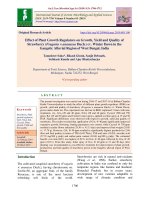
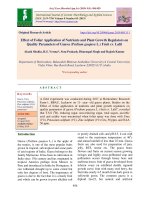
![Effect of different plant growth regulators on shooting of stem cuttings in dragon fruit [Hylocereus undatus (Haworth) Britton & Rose]](https://media.store123doc.com/images/document/2020_01/09/medium_isb1578564896.jpg)
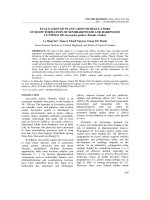

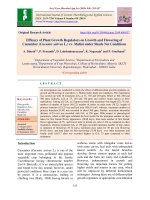
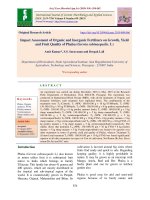
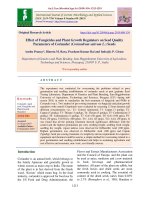

![Role of plant growth regulators on quality seed yield of bottle gourd [Lagenaria siceraria (Mol.) Standl.]](https://media.store123doc.com/images/document/2020_03/11/medium_cah1583900849.jpg)